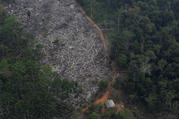Loading...
Click here if you don’t see subscription options
Click here if you don’t see subscription options

FaithJesuitical
A conversation with The Atlantic’s Emma Green.

Politics & SocietyShort Take
In “Laudato Si’,” Pope Francis called drinkable water a human right. But as Nathan Beacom writes, our methods of farming and raising livestock are degrading our soil and polluting our waterways.

FaithPodcasts
This week on "Inside the Vatican," the hosts discuss the Holy See's opposition to a U.S.-backed proposal for Israel to annex up to 30 percent of the West Bank.

FaithVatican Dispatch
Francis called for reflection on the encyclical in which he “sought to draw attention to the cry of the earth and of the poor.”

Politics & SocietyNews
Bishops' conferences from Brazil, Indonesia and Ireland are announcing their intent to divest from fossil fuel companies, in keeping with the spirit of Pope Francis' Laudato Si' encyclical, which was released five years ago.

Politics & SocietyShort Take
Five years ago, Pope Francis raised consciousness about caring for our common home, writes Mark Graham. Now the Vatican must prioritize the reduction of greenhouse gas emissions before it is too late.

Politics & SocietyVatican Dispatch
Pope Francis asked the group to ‘prepare the future’ not ‘prepare for the future.’

Politics & SocietyShort Take
Any ambitious program to address climate change raises a red flag of top-down government, writes Christopher Rice, but the Green New Deal can be implemented with support for local decision-making.

FaithVatican Dispatch
Pope Francis also drew attention to Africa and recalled that 40 years ago, St. John Paul II spoke out about the plight of the people of the Sahel.

Politics & SocietyNews
In Italy, the pandemic presents economic and social challenges, especially when it comes to food distribution, hygiene, and employment.
